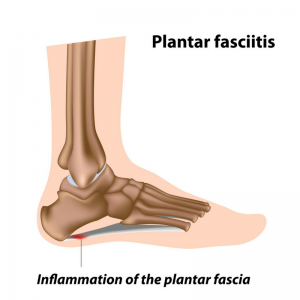“Ouch!”
“My heel hurts. I can’t walk and stand as I used to. And my first step from the bed in the morning is the worst. It is so annoying! I can’t climb the stairs from the stabbing pain, I need to put my feet up and rest to get relief. It then reappears as soon as I take another step!!”

If you are going through what I have mentioned above, then you are suffering from Plantar Fasciitis; one of the most common causes of heel pain.
Sometimes, it is extremely severe that you need to cut down your physical activities or give up on your passion for Sports or general activities of daily living.
But there is hope; you can get your feet back on the ground like before with the help of a specialist at Faye Pattison Physiotherapy.
In this post, you will learn what Plantar Fasciitis is, common causes, prevention methods and manual therapy such as Physiotherapy or Soft Tissue Therapy management that you can benefit from.
You know what, you are lucky if you are living or working in Chelmsford, Essex. We, the Winners of the BEST MUSCULOSKELETAL CLINIC IN THE SOUTH EAST will provide you with a step by step guide and be with you every part of the way to help manage your Plantar Fasciitis through hands on therapy, stretching, Exercises, and potentially Orthotics if it is of a biomechanical nature.
Read more about orthotics for plantar fasciitis here!
Let’s get started!
What is plantar fasciitis?
Fascia is an internal connective tissue, which connects, supports and holds organs and other parts of our internal body structure.
Similarly, a fascia located on the plantar side of our foot that extends from the Achilles Tendon, wraps under the heel and toes is known as Plantar Fascia. It gives support and absorbs shock while walking, running and jumping. It also helps in maintaining the natural curve of your foot.
Any repetitive injuries, causing multiple tiny tears to the plantar fascia, leads to inflammation, stiffness, and pain.
An inflammation of the plantar fascia is known as plantar fasciitis.
Causes of Plantar Fasciitis
Following are common activities that often cause tension, stretching and tearing of Plantar Fascia.
• Excessive running
• Excessive walking
• Improper footwear
• Weak Plantar Muscles
• Foot Biomechanics e.g. Flat feet or poor control
• Poor landing technique upon jumping
Symptoms of Plantar Fasciitis
• Pain in the sole
• Tenderness to touch (on palpation on the medial tubercles of the heel bone)
• First few steps in the morning are the worst and very painful but this does decreases gradually
• Running barefoot, on your toes or climbing stairs aggravate the pain.

How Physiotherapy and Soft Tissue Therapy can help Plantar Fasciitis
Soft tissue manipulation
Muscles and soft tissue of foot affected with Plantar fasciitis get taut or tight. To bring back the elasticity of the soft tissue to get rid of pain, Soft Tissue Manipulation from an expert Therapist plays a great role.
With the help of Soft Tissue Manipulation, the local blood circulation increases, it softens the taut muscles and tissues and relieves pain.
Exercises
Taut muscles of your feet and calves aggravate Plantar Fasciitis. Stretching exercises to loosen the tight muscles is important.
Your Physiotherapist at Faye Pattison Physiotherapy will teach you stretching exercises where necessary for a home based program.
There are three main Orthotics to manage Plantar Fasciitis. Heel pads, Shoe Insoles, and Night Splints however these are NOT UNIQUE to YOUR feet.
We believe in if you’re going to do a job, do it properly, so to find out more how our Custom made orthotics can help SOLVE your plantar fasciitis along with putting your foot into the CORRECT position for future activities Click Here.
The orthotics helps in reducing your symptoms due to inflammation caused by repetitive strains and tears and relieve the tension of the Plantar Fascia-band.
We provide Orthotics to help you get rid of your heel pain.
Postural training
Poor posture or improper techniques for running, walking, jumping and any other activities involving feet is the main cause of Plantar Fasciitis. It is important to get correct techniques for your activities to treat and prevent from being the victim again.
Your Therapist will access you and how you are performing the activities, and correct according to the proper techniques.
Kinesiology Tape/ Rock Tape
Another reason to get pain in the heel is a weakness of intrinsic muscles of the feet that maintains the arc. Along with the strengthening exercises, our therapists may also apply tape to support the arc of the feet to prevent from stress on your Plantar Fascia.
Final Thoughts
In this post, you have learned all the outline of Plantar Fasciitis, symptoms and causes, and how a a therapist be it a physiotherapist or one of our soft tissue therapists can help you to get rid of plantar fasciitis.
So, if you are out there, frustrated and annoyed with pain in the heel and wishing to run, walk and jump like you used to, then you know what to do and where to go.





